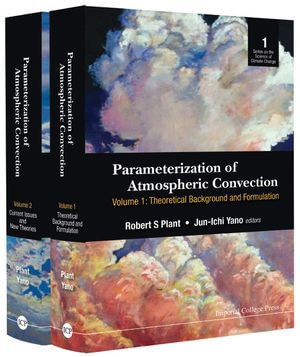
eTEXT
Parameterization of Atmospheric Convection
(In 2 Volumes) Volume 1: Theoretical Background and Formulation Volume 2: Current Issues and New Theories
By: Robert S Plant
eText | 21 August 2015
At a Glance
eText
$430.10
Instant online reading in your Booktopia eTextbook Library *
Read online on
Not downloadable to your eReader or an app
Why choose an eTextbook?
Instant Access *
Purchase and read your book immediately
Read Aloud
Listen and follow along as Bookshelf reads to you
Study Tools
Built-in study tools like highlights and more
* eTextbooks are not downloadable to your eReader or an app and can be accessed via web browsers only. You must be connected to the internet and have no technical issues with your device or browser that could prevent the eTextbook from operating.
Precipitating atmospheric convection is fundamental to the Earth's weather and climate. It plays a leading role in the heat, moisture and momentum budgets. Appropriate modelling of convection is thus a prerequisite for reliable numerical weather prediction and climate modelling. The current standard approach is to represent it by subgrid-scale convection parameterization.
Parameterization of Atmospheric Convection provides, for the first time, a comprehensive presentation of this important topic. The two-volume set equips readers with a firm grasp of the wide range of important issues, and thorough coverage is given of both the theoretical and practical aspects. This makes the parameterization problem accessible to a wider range of scientists than before. At the same time, by providing a solid bottom-up presentation of convection parameterization, this set is the definitive reference point for atmospheric scientists and modellers working on such problems.
Volume 1 of this two-volume set focuses on the basic principles: introductions to atmospheric convection and tropical dynamics, explanations and discussions of key parameterization concepts, and a thorough and critical exploration of the mass-flux parameterization framework, which underlies the methods currently used in almost all operational models and at major climate modelling centres. Volume 2 focuses on the practice, which also leads to some more advanced fundamental issues. It includes: perspectives on operational implementations and model performance, tailored verification approaches, the role and representation of cloud microphysics, alternative parameterization approaches, stochasticity, criticality, and symmetry constraints.
Precipitating atmospheric convection is fundamental to the Earth's weather and climate. It plays a leading role in the heat, moisture and momentum budgets. Appropriate modelling of convection is thus a prerequisite for reliable numerical weather prediction and climate modelling. The current standard approach is to represent it by subgrid-scale convection parameterization.
Parameterization of Atmospheric Convection provides, for the first time, a comprehensive presentation of this important topic. The two-volume set equips readers with a firm grasp of the wide range of important issues, and thorough coverage is given of both the theoretical and practical aspects. This makes the parameterization problem accessible to a wider range of scientists than before. At the same time, by providing a solid bottom-up presentation of convection parameterization, this set is the definitive reference point for atmospheric scientists and modellers working on such problems.
Volume 1 of this two-volume set focuses on the basic principles: introductions to atmospheric convection and tropical dynamics, explanations and discussions of key parameterization concepts, and a thorough and critical exploration of the mass-flux parameterization framework, which underlies the methods currently used in almost all operational models and at major climate modelling centres. Volume 2 focuses on the practice, which also leads to some more advanced fundamental issues. It includes: perspectives on operational implementations and model performance, tailored verification approaches, the role and representation of cloud microphysics, alternative parameterization approaches, stochasticity, criticality, and symmetry constraints.
Readership: Atmospheric scientists and modellers.Key Features:
- The first coherent book to focus on convective parameterization for climate modelling and numerical weather prediction
- Clear focus on the underpinning theory of parameterization, and its possible extensions
- Places current efforts to improve parameterizations firmly into the theoretical context rather than focusing on details of the technical implementation or changes to overall model performance
Read online on
ISBN: 9781783266920
ISBN-10: 1783266929
Series: Series On The Science Of Climate Change : Book 1
Published: 21st August 2015
Format: ePUB
Language: English
Number of Pages: 536
Publisher: World Scientific Publishing
Volume Number: 1























